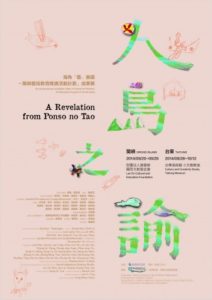Orchid sound project, 2014
A Revelation from Ponso no Tao, An achievement exhibition after A Coastal Art Paradise: Art Education Program in Orchid Island
Venue: Taitung Museum, Taitung 2014/09/28~10/12, Lan An Cultural and Education Foundation, Orchid Island 2014/09/18-09/25
curated by Sandy Lo
jiandyin have acquired Orchid Composition #2 through collaborative and participatory process for communicating the historical events and alternative future of the Orchid Island, Taiwan to represent the parallel dimension of time from past, present and alternative future over timelines of 1200-2024. While the flag was collaboratively generated by creative forces that move backward and forward, at the same time, to the future, work process questions the reaction energy of the Orchid Island that is lost in translation.
Orchid Composition #2 site specifically captures the reaction energy of the Orchid Island / work comprises of performance with Flag designed by 8 representative children from the island / a translated manifesto in the form of 3-language notices – Chinese / English / Tao (native language on Orchid Island)
Orchid Composition #3 is an exploration of the Orchid island children’s thought and imagination towards the future of the Island in the next 10 years. Artists have acquired this work by collaborative and participatory process to invent a tool set for communicating the historical events and alternative future of the Orchid Island towards varied approaches through representative children on the island.
One ethnic minority group has been living on an island in Pacific Ocean call Orchid Island or Lan Yu Island in Chinese. They named themselves “Tao Wu”, means human and they named their island “Ponso No Tao”, means an island of human.
Tao Wu ancestors traveled by small canoes called Tatara through the Luzon Strait toward Batanes Islands north of the Philippines and finally found the island around 1200 AD. Since then, the Orchid island had become their single empirical world. Until 1600 AD, when Dutch shipwrecked near the island in a typhoon, the island had more contact to the outside world.
Japanese had explored the island since 17th century and considered the island a type of living anthropological museum.
During the Pacific war, Japanese Army occupied the island, until the war became more intense, the island became a military base camp to support the army forces to the Pacific War. At the end of the war, Orchid Island was one of the targets attacked by the US Air Force.
When the Japanese announcement of intent to surrender, the US army took over the island and returned it for Taiwan, under the Kuomintang government.
1964, Taiwan government organized compulsory education and Chinese has been the central language on the island since then.
1979, A cannery was built on the island. 3 years later, 2,000 tons of nuclear waste arrived every month and stored there until today.
Looking at Tao Wu as outsiders, a question raised in the mind: Who are we? If Tao Wu, in respect of “human”, belongs to the global ethnic tribes, do they own cultural rights to preserve and develop their own community?

